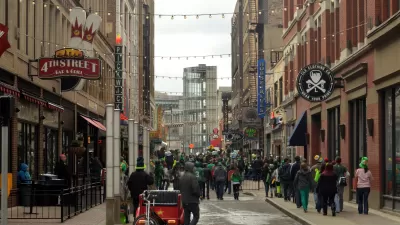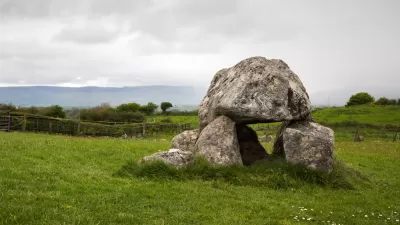A new report released this week seeks to address whether the "urban health advantage" can be extended to more of the world’s population as cities continue to grow in the coming decades, reports Katherine Harmon.
While cities are thought to be an overall aid to general health due to better access to health care and improved overall infrastructure, it takes good planning to ensure that potentially harmful effects are minimized. Lessons of good planning practices will become increasingly important as the world, and especially the developing world, continue to urbanize.
That is the impetus behind a new report authored by Yvonne Rydin, of the University College London's Bartlett School of Planning, and published this week that, "examines several initiatives across the globe-from providing gardening
plots to urban residents in Cuba, to improving the pedestrian experience
in Bogota, Colombia-to see what's working and how we can best prepare
for continued urban growth."
"The authors conclude that urbanization alone will not automatically help
everyone lead healthier, happier lives," writes Harmon. "To improve the health of all urban dwellers-present and
future-concerted planning will be necessary, but global payoffs will be
great."
FULL STORY: Can the “Urban Advantage” Bring Better Global Health as City Populations Skyrocket?

Alabama: Trump Terminates Settlements for Black Communities Harmed By Raw Sewage
Trump deemed the landmark civil rights agreement “illegal DEI and environmental justice policy.”

Planetizen Federal Action Tracker
A weekly monitor of how Trump’s orders and actions are impacting planners and planning in America.

The 120 Year Old Tiny Home Villages That Sheltered San Francisco’s Earthquake Refugees
More than a century ago, San Francisco mobilized to house thousands of residents displaced by the 1906 earthquake. Could their strategy offer a model for the present?

In Both Crashes and Crime, Public Transportation is Far Safer than Driving
Contrary to popular assumptions, public transportation has far lower crash and crime rates than automobile travel. For safer communities, improve and encourage transit travel.

Report: Zoning Reforms Should Complement Nashville’s Ambitious Transit Plan
Without reform, restrictive zoning codes will limit the impact of the city’s planned transit expansion and could exclude some of the residents who depend on transit the most.

Judge Orders Release of Frozen IRA, IIJA Funding
The decision is a victory for environmental groups who charged that freezing funds for critical infrastructure and disaster response programs caused “real and irreparable harm” to communities.
Urban Design for Planners 1: Software Tools
This six-course series explores essential urban design concepts using open source software and equips planners with the tools they need to participate fully in the urban design process.
Planning for Universal Design
Learn the tools for implementing Universal Design in planning regulations.
Clanton & Associates, Inc.
Jessamine County Fiscal Court
Institute for Housing and Urban Development Studies (IHS)
City of Grandview
Harvard GSD Executive Education
Toledo-Lucas County Plan Commissions
Salt Lake City
NYU Wagner Graduate School of Public Service




























